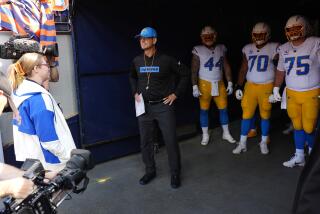(Quarter)Back Pain : Montana, Grogan Constantly at Risk
- Share via
There’s one thing you can count on when you get to be an old man. Over 30, say.
You can count on having a bad back.
Ask Grandpa
Ask Joe Montana.
Or ask Steve Grogan.
As pro football quarterbacks, driven by the same fierce will to win, Montana, 34, and Grogan, 37, are content only in the fury of NFL competition, when they can take a football and, figuratively, beat someone up. And throwing hard passes is very hard on the back.
Worse are the hits that Montana and Grogan take when they are beaten up, or only smashed around or driven into the ground.
Their backs aren’t what they used to be. And their doctors, after poring through the X-rays, have advised both to give up football, getting the word to Montana for the first time four years ago and to Grogan last year.
Fat chance.
Montana has started every game this season for the San Francisco 49ers, and Grogan, a 16-year NFL veteran, was starting regularly for the New England Patriots until--you guessed it--he hurt his back again this month.
That incident--Grogan’s 12th major injury in a series that has included a broken hand, a broken leg, a broken knee, elbow surgery, knee surgery, neck surgery and assorted head, back and neck injuries--led the Patriots to take action at last.
They told Grogan to acknowledge in writing that a Boston spine specialist has recommended that he forsake football forever as a way of life.
“Is that all? Where do I sign?” said Grogan, who, after 20 years in college and pro football, still counts the day lost when he isn’t beating or browbeating defensive players, bad back or bad hand.
On the advice of their attorneys, the Patriots had sought Grogan’s autograph to protect them in lawsuits, if any.
“Steve saw five specialists, all highly qualified, and four told him he could go on playing,” Patriot General Manager Patrick Sullivan said. “Only one of the doctors said that it would be unsafe for him to play any more football--but one can be enough in a (courtroom).
“We simply asked Steve to acknowledge all that. We wanted to be sure that five or 10 years down the road, he can’t say we didn’t inform him. If you know Steve, you know it’s unlikely that he would. But times change.”
Sullivan’s action wasn’t an NFL first.
“The Patriots have similar letters on file from at least 10 other players,” Boston Herald reporter Kevin Mannix said. “They trade for a guy with a knee, they might ask him to acknowledge that he had pre-existing knee trouble.”
Said 49er Vice President John E. McVay: “That sort of thing is rather common in the league these days.”
In Grogan’s case, though, in one key respect, it was uncommon.
“It’s very unusual to be asked to sign one of those letters during the season,” Grogan said. “It’s normal during the off-season, but a little surprising in the regular season.”
Thus, the Patriots are worried about him. They are more concerned than Grogan.
Over the years, the 49ers have also been more concerned than Montana about Montana.
In November 1986, with their quarterback strapped on a hospital bed after a back operation, the 49ers were badly shaken when they saw the headline: “Surgeon Tells Montana to Quit.”
But he wouldn’t quit. And when, shortly thereafter, the 49ers reactivated him, the record shows that nobody on the club asked him to sign an injury acknowledgement. It wasn’t even considered.
“Joe’s out there giving everything he’s got in a tough, physical game,” 49er owner Edward DeBartolo Jr. said. “The last thing he needs is me putting more pressure on him.”
Montana has signed one document lately, a new contract that will pay him $4 million this year--or $3 million more than New England is paying Grogan, whose bad back and talent are similar to Montana’s.
“You can see that Joe and I are in different organizations,” Grogan said.
FOR OLD QUARTERBACKS, IT’S A PUNISHING LIFE
The date was Nov. 4, 1990. The place, Philadelphia. The opponent was an Eagle defensive team led by the NFL’s best defensive player, 285-pound pass rusher Reggie White.
“I don’t move the way I used to,” said Grogan, who in the late 1970s had been one of the game’s great running quarterbacks, the Randall Cunningham of his day. “And if Reggie White and those guys think you can’t move, they come and get you.”
On that afternoon, they came and got Grogan. He was one of four starting quarterbacks knocked out by the Eagle defense in a stretch of four games. He hasn’t played since. He may never play again.
“It depends on how soon this (back) quiets down,” he said.
Grogan had taken his first blow of the season two months earlier in Indianapolis when, just as he got a pass off, he was clobbered by linebacker Chip Banks.
“Steve went down with (neck and upper back) injuries that time, and came off flexing his shoulder,” Boston reporter Mannix said. “He missed four games, then got through the Buffalo game (unscathed). Then he ran into the Eagles.”
Or vice versa.
“The Grogan problem is not so much Grogan as it is his offensive line,” Mannix said. “It’s a bad line that can’t protect anybody. The Eagles murdered him.”
For an older quarterback, clearly, pro football can be a hard life. At times, it can be quite dangerous. How dangerous? That’s hard to say, because football doctors are reluctant to speak for the record.
None of Grogan’s five doctors returned phone calls.
Even in Boston, Mannix said, “They haven’t returned a call this year (on) Grogan.”
But the doctors have talked things over with the club and the patient. And, Grogan said, “The (injury) is a slight bulge in the upper back between the second and third thoracic vertebrae.
“Only one doctor recommended against my playing. If three of the five had recommended it, I would have retired.”
In pro football, that’s the way a competitor calculates the odds.
After Montana’s surgery four years ago, the doctors said one disk had ruptured. They removed it, widened the spinal canal and urged him to bore himself with daily back exercises the rest of his life if he wanted to live normally. Without football, they meant.
“I haven’t missed one day of exercise since then,” Montana said. “I don’t necessarily do it first thing every morning, but I never miss doing five minutes a day, and usually 10.
“The stomach is the key to the back. I do a bunch of sit-ups to strengthen the stomach muscles, which keeps the back stable.
“I also do Roman chair work and extensions--that is, hanging by a bar--and other things that are as boring to talk about as they are to do. But, you see, playing football isn’t a bore.”
Not for Montana. From Notre Dame through four Super Bowls, Montana has probably had more fun playing football than anyone.
Yet he was supposed to quit four years ago, at least.
“I’m afraid that’s not really true,” Montana said. “What my doctor (Arthur White) really said was, ‘You’re crazy if you play football again. Anyone who plays football is crazy.’ ”
Grogan’s doctor, Lawrence Borges, apparently took the same tack.
“Dr. Borges has a perception that football is dangerous,” the Patriots’ Sullivan said. “He treats a lot of our players, and it isn’t just (Grogan) who’s at risk, in (Borges’) opinion. He tells them they’re all at risk playing pro ball.”
Does anybody seriously doubt that?
Well, Grogan, for one.
And Montana.
HAPPINESS IS FINDING SOMETHING YOU LOVE
The players on many NFL clubs organize basketball teams in the off-season, and on the theory that games are less tedious than other forms of exercise, meet all comers all spring.
Standing 6 feet 4, Grogan, not surprisingly, has been on the New England basketball team for most of his 16 NFL years--whenever, that is, he could get away from the orthopedists or surgeons.
But as a basketball player, he is a pain in the neck to New England’s front office.
“We have to warn him every year to keep his elbows to himself,” Sullivan said. “The guy is in the middle of every fight. He’s always fouling out.”
Instead of taking it easy in the off-season, “(Grogan) goes all out every night to win meaningless (basketball) games,” Sullivan said. “He is the most competitive person I know.”
And so it is that each fall, despite a series of injuries that should have ended his football career long ago, Grogan puts the uniform on again.
In a young man’s game, what drives this beaten-up old quarterback?
“I very much enjoy the level of competition you find in the NFL,” Grogan said. “You don’t get it anywhere else. Football gives you the opportunity to test yourself physically against the very best.
“Finding something you love to do in this world isn’t as easy as people think. To walk away--if you truly love it--I can’t do it.
“I feel like I was given a talent to play this game, and I know it won’t last forever. I know I can’t play at 50. I just want to extend it as long as I can, as long as it’s safe.”
Montana’s attitude was identical when he was wheeled into surgery four years ago. And it was the same when they wheeled him out.
“I don’t ever plan to (retire),” he said again the other day.
Montana’s great rival in the NFC run for the Super Bowl this year, Phil Simms of the New York Giants, said that an athlete with Montana’s attitude--or Grogan’s--is precisely what it takes to be an NFL quarterback.
“There are some players in this league who aren’t very competitive,” said Simms, who will play against Montana Monday night at Candlestick Park. “But none of them are quarterbacks. The quarterbacks are all desperately competitive.”
They can often win, therefore, when they are old and hurt.
“I played great football for two games earlier in the year, before I was (injured),” Grogan said. “That tells me I can still do it.”
At times, however, it puts a strange load on his opponents.
Buffalo Bill defensive end Leon Seals, confessing that he felt uneasy about sacking a crippled quarterback, said: “It’s a touchy situation. (Before the game) I said I just hope I’m not the one who hits (Grogan) and he stays down.”
Old quarterbacks are often also a load on club owners.
In San Francisco this year, 49er owner DeBartolo, appreciating Montana’s interest in playing possibly into his 40s, struck a strange deal with him. He agreed to a salary of $4 million for Montana this season on one condition: lower salaries every season hereafter.
Montana snapped it up.
“We’ll both get our money’s worth,” DeBartolo said.
Grogan isn’t that lucky. As DeBartolo’s quarterback, he might have matched Montana’s 12-year record. Instead, in 1975, Grogan began a career in New England on one of the NFL’s worst clubs.
Why hasn’t that hastened his retirement?
Patriot wide receiver Irving Fryar, considering the question, thinks back to Grogan’s last game, when the Eagles drove him into the ground six times on 19 pass attempts.
Although he could play no more that day, he refused to go to the pits. Standing on the sideline, Grogan followed the game intently.
“He wanted to compete so bad that tears were coming to his eyes,” Fryar said. “I’ve never seen that before.”
More to Read
Go beyond the scoreboard
Get the latest on L.A.'s teams in the daily Sports Report newsletter.
You may occasionally receive promotional content from the Los Angeles Times.










